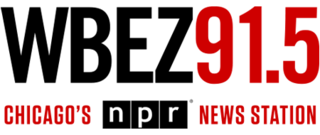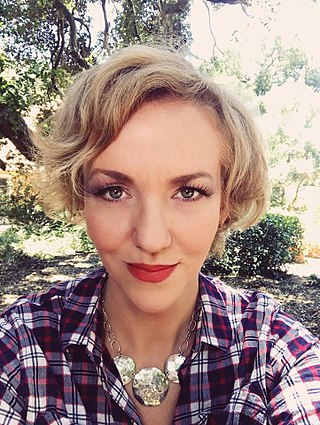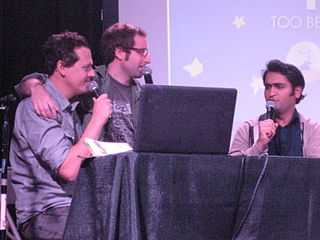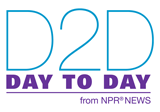
Talk of the Nation (TOTN) is an American talk radio program based in Washington D.C., produced by National Public Radio (NPR) that was broadcast nationally from 2 to 4 p.m. Eastern Time. It focused on current events and controversial issues.
Morning Edition is an American radio news program produced and distributed by NPR. It airs weekday mornings and runs for two hours, and many stations repeat one or both hours. The show feeds live from 5:00 to 9:00 AM ET, with feeds and updates as required until noon. The show premiered on November 5, 1979; its weekend counterpart is Weekend Edition. Morning Edition and All Things Considered are among the highest rated public radio shows.

All Things Considered (ATC) is the flagship news program on the American network National Public Radio (NPR). It was the first news program on NPR, premiering on May 3, 1971. It is broadcast live on NPR affiliated stations in the United States, and worldwide through several different outlets, formerly including the NPR Berlin station in Germany. All Things Considered and Morning Edition were the highest rated public radio programs in the United States in 2002 and 2005. The show combines news, analysis, commentary, interviews, and special features, and its segments vary in length and style. ATC airs weekdays from 4:00 p.m. to 6:00 p.m. Eastern Time (live) or Pacific Time or from 3:00 p.m. to 5:00 p.m. Central Time. A weekend version of ATC, Weekend All Things Considered, airs on Saturdays and Sundays.

Wait Wait... Don't Tell Me! is an hour-long weekly news radio panel show produced by WBEZ and National Public Radio (NPR) in Chicago, Illinois. On the program, panelists and contestants are quizzed in humorous ways about that week's news. It is distributed by NPR in the United States, internationally on NPR Worldwide and on the Internet via podcast, and typically broadcast on weekends by member stations. The show averages about six million weekly listeners on air and via podcast.

WBEZ – branded WBEZ 91.5 – is a non-commercial educational radio station licensed to Chicago, Illinois, and primarily serving the Chicago metropolitan area. It is owned by Chicago Public Media and is financed by listener contributions, corporate underwriting and some government funding. WBEZ is affiliated with both National Public Radio (NPR) and the Public Radio Exchange (PRX). It also broadcasts content from American Public Media and the BBC World Service. It produces several nationally syndicated shows for public radio stations, including This American Life and has a co-production credit for Wait Wait... Don't Tell Me!, which is produced by NPR.

Jefferson Public Radio (JPR) is a regional public radio broadcasting network serving over a million potential listeners in Southern Oregon and the Shasta Cascade region of northern California. Owned by Southern Oregon University, the network is headquartered on the SOU campus in Ashland, near Medford. It is named after the proposed State of Jefferson, an area which roughly corresponds to its vast and mostly mountainous coverage area of 60,000 square miles (160,000 km2).
Alison Stewart is an American journalist and author. Stewart first gained widespread visibility as a political correspondent for MTV News in the 1990s. She is the host of WNYC's midday show, All of It with Alison Stewart.

Xeni Jardin is an American weblogger, digital media commentator, and tech culture journalist. She is known as a former co-editor of the collaborative weblog Boing Boing, a former contributor to Wired Magazine and Wired News, and a former correspondent for the National Public Radio show Day to Day. She has also worked as a guest technology news commentator for television networks such as PBS NewsHour, CNN, Fox News, MSNBC and ABC.

Weekend Edition is a set of American radio news magazine programs produced and distributed by National Public Radio (NPR). It is the weekend counterpart to the NPR radio program Morning Edition. It consists of Weekend Edition Saturday and Weekend Edition Sunday, each of which airs for two hours, from 8:00 a.m. to 10:00 a.m. Eastern time, with refeeds until 2:00 p.m. Weekend Edition Saturday is hosted by Scott Simon. Weekend Edition Sunday is hosted by Ayesha Rascoe.

News broadcasting is the medium of broadcasting various news events and other information via television, radio, or the internet in the field of broadcast journalism. The content is usually either produced locally in a radio studio or television studio newsroom, or by a broadcast network. It may include material such as sports coverage, weather forecasts, traffic reports, political commentary, expert opinions, editorial content, and other material that the broadcaster feels is relevant to their audience. An individual news program is typically reported in a series of individual stories that are presented by one or more anchors. A frequent inclusion is live or recorded interviews by field reporters.

Luke Burbank is an American radio host and podcaster who hosts the Portland, Oregon-based syndicated variety show Live Wire Radio and the Seattle-based former radio program and current podcast Too Beautiful to Live. He was most recently co-host of "The Ross and Burbank Show" and host of "The Luke Burbank Show" on Seattle's KIRO-FM radio station. Burbank is also a correspondent for CBS News Sunday Morning.

Here and Now is a public radio magazine program produced by NPR and WBUR-FM in Boston and distributed across the United States by NPR to over 450 stations, with an estimated 5 million weekly listeners.
KCPW-FM is a public radio station in Salt Lake City, Utah. It airs local news and music programming, as well as network shows from American Public Media, Public Radio International, the Canadian Broadcasting Corporation and the BBC. It broadcasts from studios at the Salt Lake City Public Library in Downtown Salt Lake City at Library Square.
Classical 24 is a syndicated, satellite-delivered public radio service providing classical music to its carrying stations. It generally airs overnights on many non-commercial and a handful of commercial classical music stations. However, the service is operated 24 hours a day and is used by some stations during the day to augment their schedules. It was co-created by a partnership between Minnesota Public Radio and Public Radio International to fulfill the need for a comprehensive classic music service for stations to supplement their schedules. As part of this partnership, the service is produced by American Public Media and since 2018, is distributed by Public Radio Exchange. It began operation on December 1, 1995.
KVCR is an FM non-commercial public radio station in located San Bernardino, California, broadcasting to the Riverside-San Bernardino-Inland Empire area. It is owned by the San Bernardino Community College District, along with channel 24 KVCR-DT. KVCR asks for donations from its listeners, especially during fundraisers, usually held for a week, several times per year.
Steve Proffitt is an American radio journalist who is the former Senior Producer for the NPR newsmagazine, Day to Day. Proffitt began his public broadcasting career at KERA in Dallas. He joined NPR in 1980 and served as an editor and producer. It was there that he began producing short, highly produced features on banal topics: a 1982 piece, DUST being an example his early work.
Alex Chadwick is an American journalist best known for his work on National Public Radio, and as a former co-host of the radio newsmagazine Day to Day. He was a part of the development of NPR's Morning Edition in the 1970s and was an on-air personality on All Things Considered and Weekend Edition. Chadwick has also worked with ABC and CBS.
Madeleine Brand is an American broadcast journalist and radio personality. Brand is the host of the news and culture show Press Play, on KCRW-FM (89.9), one of Los Angeles' two National Public Radio (NPR) affiliates. The show made its debut in January 2014. Brand broadcasts from the basement of the cafeteria of Santa Monica College.
The Bryant Park Project was a short-lived morning radio newsmagazine from National Public Radio that ran for 10 months in 2007 and 2008. The show's name was derived from Bryant Park in Manhattan, which NPR's New York studios overlook. While the Bryant Park Project was originally a working title, the show debuted with the name intact on October 1, 2007. The multi-platform show was broadcast live from 7 to 9 a.m. Eastern time, Monday through Friday and, at its height, was carried by 13 NPR member stations, mostly in small markets. The Sirius Satellite Radio station NPR Now repeated the show from 10 a.m. to noon Eastern, 7 to 9 a.m. Pacific.










